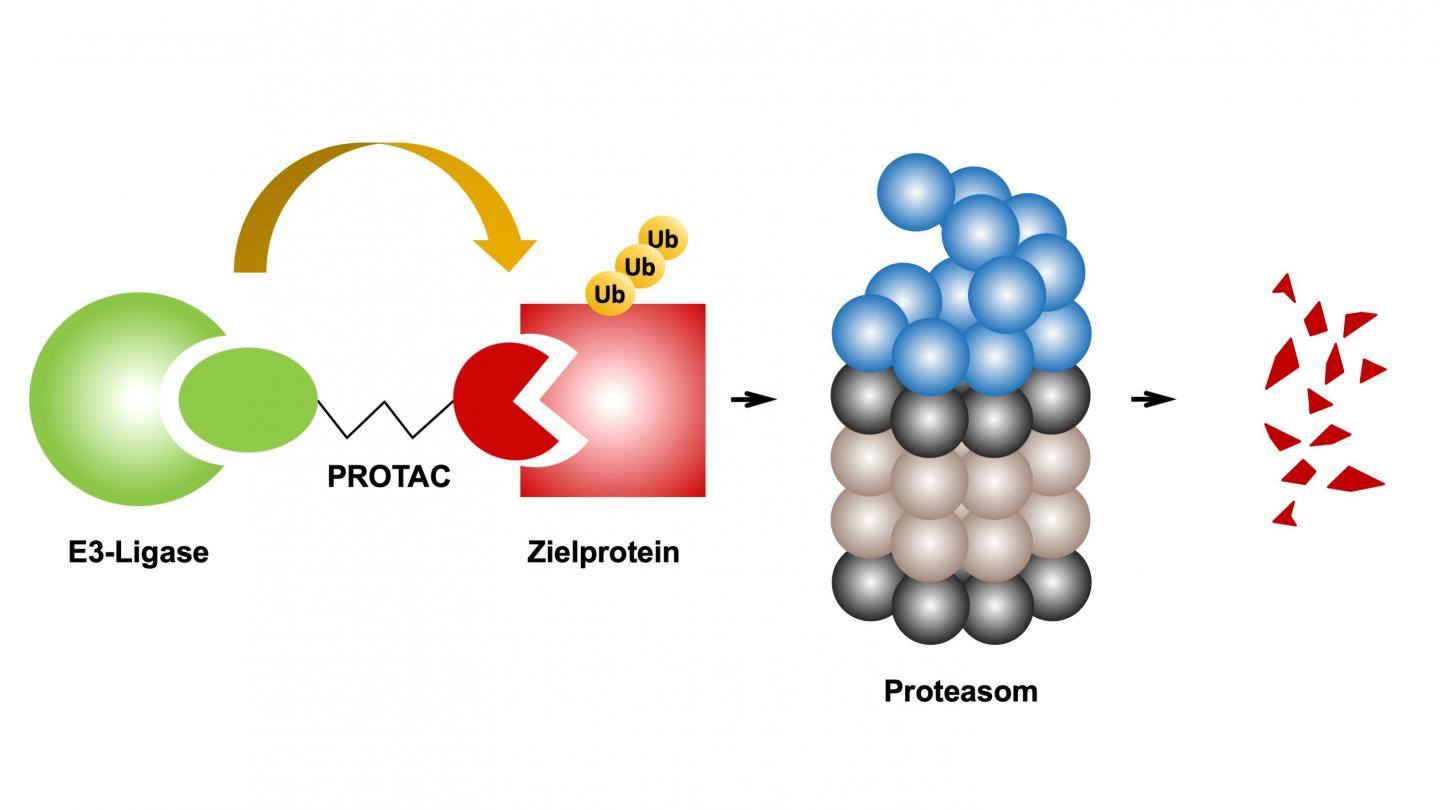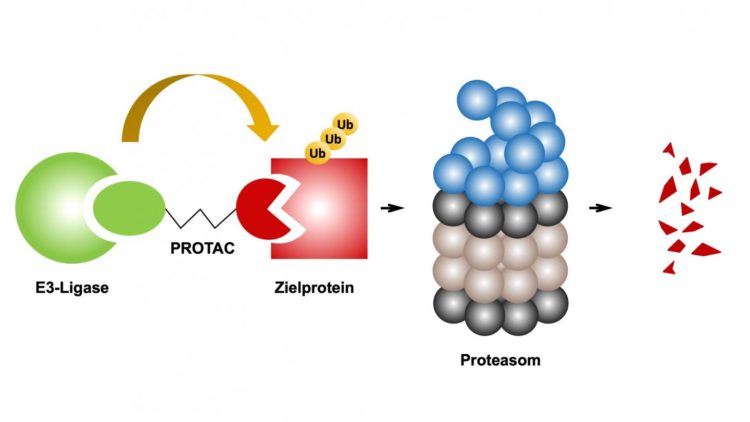PROXIDRUGS project led by Goethe University included in concept phase of ‘Clusters4Future’ program – search for novel active components for therapeutic solutions

Credit: Institute of Biochemistry II, Goethe University
PROXIDRUGS, the regional network led by Goethe University, aims at developing active molecules for selective intervention, opening new therapeutic avenues. Within the “Clusters4Future” ideas competition, the Federal Ministry of Education and Research has now selected the project for funding in the concept phase – as one of 16 finalists out of 137 proposals submitted.
“The body has developed an ingenious mechanism for disposing of superfluous or harmful proteins. We wish to seize this to break down disease-relevant proteins,” says PROXIDRUGS coordinator Professor Ivan ?iki? from the Institute of Biochemistry II at Goethe University, explaining the project’s rationale. Developing better therapies for diseases such as cancer, heart or inflammatory disease is the goal of the alliance of biochemists, chemists, clinicians and pharmacists from Goethe University, the Fraunhofer Institute for Molecular Biology and Applied Ecology (IME) and TU Darmstadt.
The Federal Ministry of Education and Research will support the project with funds of up to € 250,000 during the six-month concept phase starting in May. If the alliance then qualifies for the implementation phase, up to € 5 million will be available per year for PROXIDRUGS. With this funding scheme, the Ministry wants to turn scientific hotspots into powerful regional innovation networks. “Goethe University at the heart of the Rhine-Main region, a top location unique in Germany, bundles academic and industrial expertise for the development of innovative therapeutic concepts,” says Professor Simone Fulda, the University’s Vice-President, praising the consortium’s approach, which is based on reprogramming of the cell’s own systems.
Proteins destined for degradation are usually marked in an enzymatic reaction with the small protein ubiquitin. The cell’s “shredder”, the proteasome, recognizes this signal and breaks the respective protein down into its individual components, which are then recycled. At the focus of PROXIDRUGS is a novel class of drugs acting through a proximity-based mechanism: The corresponding molecules exhibit two functional units – one for the selective binding of the respective target protein and a second one to dock onto the required enzyme. In this way, any unwanted protein that has a suitable binding pocket can in principle be marked with ubiquitin and flagged for degradation.
First molecules based on this principle, called PROTACs (Proteolysis Targeting Chimeric Molecules), already exist. A major advantage is their high specificity and catalytic mode of action – meaning that each molecule can carry out multiple reactions, such that only a small amount of active drug is needed. First trials with PROTACs in prostate and breast cancer are currently underway. The researchers in the PROXIDRUGS alliance now want to create new molecules in this very promising class of drugs, e.g. for diseases that until now cannot be treated with small molecules.
One of the aims of the PROXIDRUGS alliance of Goethe University, TU Darmstadt and the Fraunhofer IME is to bundle existing expertise in basic and clinical research, in pharmaceutical and biotech companies in the Rhine-Main region within one network. “Translation of our results to the clinic will be challenging,” says ?iki?. “However, thanks to close collaboration with regional companies, which have already shown great interest in the project, and the involvement of University Hospital Frankfurt, I’m confident that we’ll master this challenge.”
###
Further information: http://www.
An image and the logo can be downloaded under: : http://www.
Image Caption: Diagram of PROTACs’ mode of action. A PROTAC is bifunctional and comprises a ligand (L, green) for the enzyme E3 ligase and a binding domain (L, red) for the target protein, connected via a short linker region (black). (Graphik: IBC2/GU)
Further information: Dr Kerstin Koch, Institute of Biochemistry II, Goethe University, Theodor-Stern-Kai 7, 60590 Frankfurt am Main, Germany, Tel.: +49(0)69-6301-84250, Email: [email protected]
http://www.
Aktuelle Nachrichten aus Wissenschaft, Lehre und Gesellschaft in GOETHE-UNI online (http://www.
Die Goethe-Universität ist eine forschungsstarke Hochschule in der europäischen Finanzmetropole Frankfurt. 1914 mit privaten Mitteln überwiegend jüdischer Stifter gegründet, hat sie seitdem Pionierleistungen erbracht auf den Feldern der Sozial-, Gesellschafts- und Wirtschaftswissenschaften, Medizin, Quantenphysik, Hirnforschung und Arbeitsrecht. Am 1. Januar 2008 gewann sie mit der Rückkehr zu ihren historischen Wurzeln als Stiftungsuniversität ein hohes Maß an Selbstverantwortung. Heute ist sie eine der drei größten deutschen Universitäten. Zusammen mit der Technischen Universität Darmstadt und der Universität Mainz ist die Goethe-Universität Partner der länderübergreifenden strategischen Universitätsallianz Rhein-Main. http://www.
Herausgeberin: Die Präsidentin der Goethe-Universität Redaktion: Dr. Anke Sauter, Referentin für Wissenschaftskommunikation, Abteilung PR & Kommunikation, Theodor-W.-Adorno-Platz 1, 60323 Frankfurt am Main, Telefon 069 798-13066, Fax 069 798-763-12531, [email protected]
Media Contact
Kersten Koch
[email protected]
49-069-630-184-250





